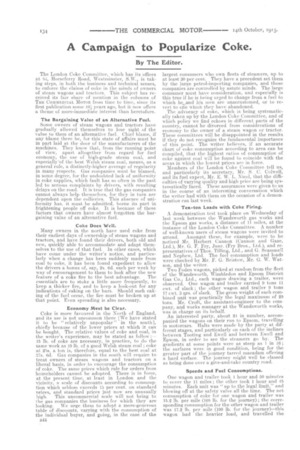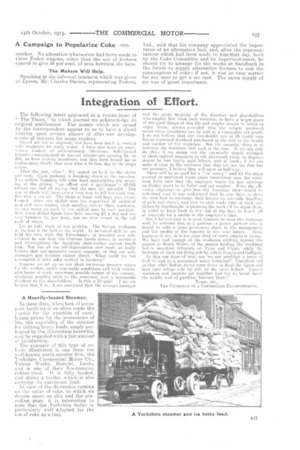A Campaign to Popularize Coke.
Page 14

Page 15

If you've noticed an error in this article please click here to report it so we can fix it.
By The Editor.
The London Coke Committee, which has its offices at 84, Horseferry Road, Westminster, S.W., is taking steps, in both the business and technical senses, to enforce the claims of coke in the minds of owners of steam wagons and tractors. This subject has received its fair share of mention in the columns of THE COMMERCIAL MOTOR from time to time, since its first publication some 10 years ago, hut it now offers a theme of more-immediate interest than heretofore.
The Bargaining Value of an Alternative Fuel.
Some owners of steam wagons and tractors have gradually allowed themselves to lose sight of the value to them of an alternative fuel. Chief blame, if any blame there be, for this state of affairs must be in part laid at the door of the manufacturers of the machines. They know that, from the running point of view, apart altogether from regard for fuel economy, the use of high-grade steam coal, and especially 'of the best Welsh steam coal, means, as a general rule, a distinctly-higher average of regularity in many respects. Gas companies must be blamed, in some degree, for the undoubted lack of uniformity in coke supplies, which fault has so often in the past led to serious complaints by drivers, with resulting delays on the road. It is true that the gas companies cannot always help themselves, for they in turn are dependent upon the collieries. This absence of uniformity has, it must be admitted, borne its part in frightening people off coke. It is because of these factors that owners have almost forgotten the bargaining value of an alternative fuel.
Coke Does Weil.
Many owners in the north have used coke from their earliest days of ownership of steam wagons and tractors, and have found their drivers, both old and new, quickly able to accommodate and adapt themselves to the use of that fuel. In other cases, which have come under the writer's notice, and particularly when a change has been suddenly made from coal to coke, it has been found expedient to allow the drivers a bonus of, say, 2s. 6d. each per week by way of encouragement to them to look after the new feature of a coke fire to the best -advantage. The essentials are to stoke a little more frequently, to keep a thicker fire, and to keep a look-out for any indications of caking on the bars. Should such caking of the fuel occur, the fire must be broken up at that point. Even spreading is also necessary.
Economy Must be Clear.
Coke is more favoured in the North of England, and its use is not uncommon there [We have stated it to be " relatively unpopular" in the south], chiefly because of the lower prices at which it can be bought. The relative values of coke and coal, in the writer's experience, may be. stated as follow :— 15 lb. of coke are necessary, in practice, to do the same work as 10 lb. of a good Welsh steam coal ; coke at 25s. a ton is, therefore, equal to the best coal at 37s. 6d. Gas companies in the south will require to treat owners of steam wagons and tractors on a liberal basis, in order to encourage the consumption of coke. The same prices which rule for orders from householders cannot be adopted. There is in force, at the present time, at least in London and the vicinity, a scale of discounts according to consumption which seldom exceeds 15 per cent. on standard prices, and standard prices just now are unusually
high. This uncommercial scale will not bring to the gas companies the business for which they are looking. We urge them to adopt a more-generous table of discounts, varying with the consumption of the individual buyer, and going, in the case of the
B44
largest consumers who own fleets of steamers, up to at least 30 per cent. They have a precedent set them by the large petrol-importing companies, and those companies are controlled by astute minds. The large consumer. must have consideration, and especially is this true if he is being urged to change from a fuel to which he,and IiI men are unaccustomed, or to revert to elle which they have abandoned.
The advocacy of coke, which is being systematically taken up by the London Coke Committee, and of which policy we find echoes in different parts of the country, cannot be divorced from considerations of economy to the owner of a. steam wagon or tractor. These committees will be disappointed in the results if they do not recognize the fundamental importance of this point. The writer believes, if an accurate chart of coke consumption according to area can be compiled, that the highest ratios of consumption of coke a.gainst coal will be found to coincide with the areas in which the lowest prices are in force.
Members of the London Coke Committee tell us, and particularly its secretary, Mr. S. C. Colwell, and its fuel expert, Mr. .E. W. L. Nicol, that the difficulties of varying quality and high price are being systematically faced. These assurances were given to us in the course of an interesting conversation which the writer had with them on the occasion of a demonstration run last week.
Ten-ton Loads with Coke Firing.
A demonstration test took place on Wednesday of last week between the Wandsworth gas works and the Epsom gas works, a distance of 11 miles, at the instance of the London Coke Committee. A number of well-known users of steam wagons were invited to attend. Amongst these, for example, were to be noticed Mr. Herbert Cannon (Cannon and Gaze, Ltd.), Mr. G. F. Fry, Junr. (Fry Bros., Ltd.), and representatives of Thos. Tilling, Ltd., and 0. Scammell and Nephew, Ltd. The fuel consumption and loads were checked by Mr. F. G. Bristow, Mr. G. W. Watson, and the writer. Two Foden wagons, picked at random from the fleet. of the Wandsworth, Wimbledon and Epsom District Gas Co.; Ltd., each wagon drawing a trailer, were observed. One wagon and trailer carried 9 tons 11 cwt. of slack ; the other wagon and trailer 9 tons 17 cwt. 3 qrs. of slack. The gross weight of each combined unit was practically the legal maximum of 20 tons. Mr. Croft, the assistant-engineer to the company, and works manager at the Wandsworth works, was in charge on its behalf. An interested party, about 24 in number, accompanied the wagons on their run to Epsom, travelling in motorcars. Halts were made by the party at different stages, and particularly on each of the inclines between Tooting and Ewell and between Ewell and Epsom, in order to see the steamers go by. The gradients at some points were as steep as 1 in 16; the surfaces were in good condition, being for the greater part of the journey tarred macadam offering a hard surface. The journey might well be classed RS being done over a give-and-take country road.
Speeds and Fuel Consumptions.
One wagon and trailer took 1 hour and 50 minutes to cover the 11 miles ; the other took 1 hour and 45 minutes. Each unit was "up to the legal limit," and blowing off at the safety valve all the time. The netconsumption of coke for one wagon and trailer was 15.2 lb. per mile (168 lb. for the journey); the corresponding consumption for the other wagon and trailer was 17.2 lb. per mile (190 lb. for the journey)—this wagon had the heavier load, and travelled the
A Campaign to Popularize Coke--con.
quicker. No alteration whatsoever had been made to these Foden wagons, other than the use of firehars spaced to give 50 per cent. of area between the bars.
The Makers Will Help.
Speaking at the informal luncheon which was given at Epsom, Mr. Charles Davies, representing Fodens,
Ltd., said that his company appreciated the importance of an alternative fuel, and, after the representations which had been made to himithat day, both by the Coke Committee and by impolitariti-Aisers, he should try to arrange for the works at Sandbach in the future to supply alternative firebars to suit the consumption of coke; if not, it was an easy matter for any user to get a set cast. The extra supply of air was of great importance.




















